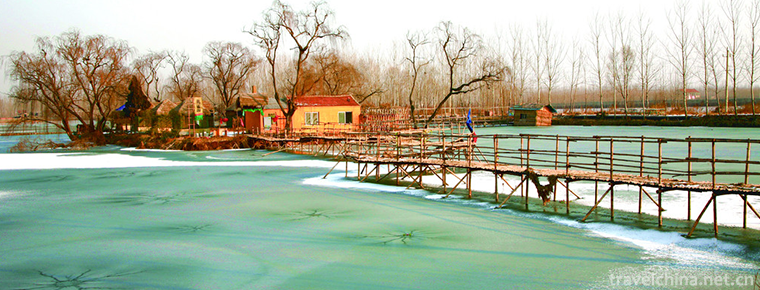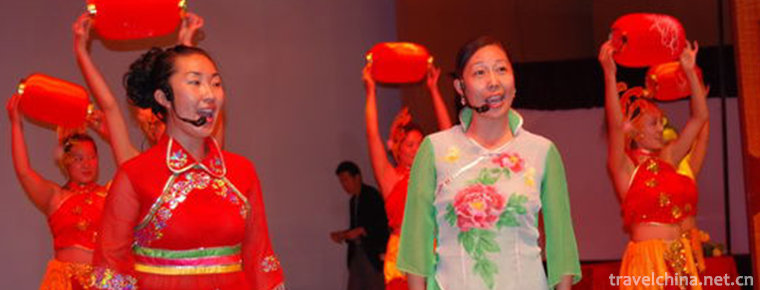2019-01-21

- By ChinaWiki.net
- Chinese Edition
- 2020-11-05
Chongzhou jiulonggou scenic spot
Chongzhou jiulonggou scenic spot is located in Sanlang Town, Chongzhou City, with an area of more than 170 square kilometers and 76 kilometers away from Chengdu City. Jiulonggou is known as "Dragon Palace on earth". The unique landscape of water, stone and peak formed by Longmen Mountain fold fault zone is related to the legend of dragon. Chongzhou is also the hometown of bamboo weaving, and bamboo weaving products are famous throughout Sichuan.
geographical environment
Chongzhou jiulonggou scenic area is located in the northwest of Chongzhou City, 38 kilometers away from Chongzhou city and 76 kilometers away from Chengdu City. The scenic area is mainly composed of jiulonggou water stone scenery, Daxishan primeval forest scenery and ancient temple, among which the dynamic water stone landscape of jiulonggou is the most attractive. Jiulonggou is located in the fault zone in front of the mouth of Longmen Mountains, with a great difference in relative height. The area is luxuriant in trees and lush in flowers and plants. The Dading mountain at the top of jiulonggou is 2600 meters above sea level. When you look northward, you can see countless green peaks and snow mountains, such as waves, sea of clouds, sunrise and Buddha light. There are magnificent ancient temples hidden in the dense forest of the ancient Temple scenic area, which is a relatively well preserved and large-scale ancient temple in the mountain forest of Chengdu area.
Chongzhou jiulonggou scenic spot covers an area of 175 square kilometers, including 32 square kilometers of sightseeing area. Jiulonggou dynamic water stone landscape is the most attractive.
Jiulonggou is located in the Qianshan fault zone in the south of Longmen Mountains. The geological structure is complex. The mountains fluctuate from 700 meters to 3868 meters above sea level, and the cliffs are steep. The area is characterized by luxuriant trees, lush flowers and plants, and good ecological environment, with the simple and delicate dynamic landscape of jiulonggou as the main feature. There are fossil rock, Pearl Spring dragon stone rock, dragon woman Huansha pool, dragon lick stone, Diamond Peak, xiangshuigou, Jiulong waterfall and other landscapes. Giant panda, golden monkey, antelope and other rare animals inhabit the primeval forest belt of Daxi mountain. The vast forest sea is full of strong wild interest.
The main peak of jiulonggou is Liuding mountain. The six peaks are like the gathering of dragons. The altitude is 2686 meters. You can see the sea of clouds, the sunrise, the moon and the light of Buddha. You can also have a glimpse of the Yin and Yang world of the pines and flowers on the Banpo. On a sunny day at the top of the peak, Chengdu Plain has a panoramic view. At night, the lights of the plain are as bright as stars.
Jiulonggou scenic area is a provincial scenic spot, 38 kilometers away from the urban area and 76 kilometers away from Chengdu. After years of development, it has a certain reception capacity.
In jiulonggou scenic area, tourists can only climb up to half the mountainside, and then they belong to the exploration channel, which is generally not open to the public. However, many beautiful sceneries of jiulonggou can be seen only after climbing the 2688 meter high Liuding mountain, the main peak of Shanghai. For example, the magnificent scenery of sea of clouds, sunrise, moon and Buddha light, the beautiful shadow of Siguniang mountain covered with snow all the year round, and the Chengdu Plain on a sunny day. To this end, the relevant departments decided to set up two "climbing ladders" to meet the wishes of tourists, one is the ropeway, the other is the mountain road. The new cableway starts from the Shenlong Pavilion 700 meters above the gate of the scenic area and goes straight to Liuding mountain, with a total length of 2000 meters and a vertical height of about 1000 meters. The new mountain road will change the existing route. It will be two different ways to go up and down the mountain. In this way, you can enjoy different scenery on the way up and down the mountain. This mountain road is like a giant dragon, with a total length of about 12 km.
Main attractions
Jiulonggou scenic spot is located at the foot of Mount Qushan, 35 kilometers southwest of Shahe City, Xingtai. It is a valley type landscape that complements nature and humanity. The main scenic spots are: Jiulong temple, jiulongtan, houlongchi, Diaoshi cliff, Huqiu mountain, taohua'an, Jiulong lake, etc. In 1992, it was approved as a provincial scenic spot by Hebei Provincial People's government. The scenic area is about 21 square kilometers. The scenic area is surrounded by nine mountain ridges, like nine giant dragons circling and extending the mouth of the ditch, so it is named "jiulonggou". Jiulong temple is built at the bottom of Jiulong ditch, which is as narrow as a line. There are Danya ancient cypresses on the top and nine Longtan streams below, which are not dried up all the year round. Chen pengzan, a famous poet in the Ming Dynasty, said: "although the two walls are divided into two parts, they seem to be closed and slightly open after half a day." The Ming and Qing emperors, Zhangde, Shunde, Guangping and other prefectures and counties have come to pray for rain and offer sacrifices for many times, and have given them golden seals for repair. The plaque of "protecting the country and Linghou" granted by the emperor in the third year of Chenghua reign of the Ming Dynasty is still preserved. Jiulonggou, with its beautiful scenery and moving legends, is known as a great wonder in Southern Hebei Province. It is a good place for sightseeing, leisure and vacation, and visiting ancient times.
Tourism information
Passenger car
1. There is a direct bus from Chengdu Chengbei passenger transport center and chadianzi station. The ticket price is about 15 yuan. It departs from Chengdu from 8:00 to 13:00 every day;
2. From Chengdu to Chongzhou, the ticket price is about 7.5 yuan, and then transfer to jiulonggou bus, which is about 5.5 yuan. The whole journey takes about 1.5 hours.
Self driving
Starting from Chengdu, get on the Chengdu wenqiong expressway, get off at Chongzhou station, and then pass Huaiyuan to the West Sichuan tourism circle line. Along the road, you can see the signs, and then you can reach jiulonggou.
Ask a Question
Your email address will not be published.



0 Questions